中考高频词汇、短语及句型
- 格式:doc
- 大小:115.06 KB
- 文档页数:11
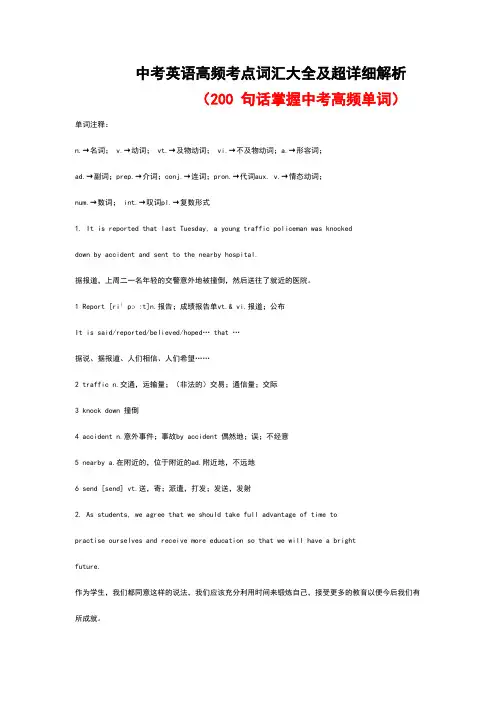
中考英语高频考点词汇大全及超详细解析(200 句话掌握中考高频单词)单词注释:n.→名词; v.→动词; vt.→及物动词; vi.→不及物动词;a.→形容词;ad.→副词;prep.→介词;conj.→连词;pron.→代词aux. v.→情态动词;num.→数词; int.→叹词pl.→复数形式1. It is reported that last Tuesday, a young traffic policeman was knockeddown by accident and sent to the nearby hospital.据报道,上周二一名年轻的交警意外地被撞倒,然后送往了就近的医院。
1 Report [riˈpɔ:t]n.报告;成绩报告单vt.& vi.报道;公布It is said/reported/believed/hoped… that …据说、据报道、人们相信、人们希望……2 traffic n.交通,运输量;(非法的)交易;通信量;交际3 knock down 撞倒4 accident n.意外事件;事故by accident 偶然地;误;不经意5 nearby a.在附近的,位于附近的ad.附近地,不远地6 send [send] vt.送,寄;派遣,打发;发送,发射2. As students, we agree that we should take full advantage of time topractise ourselves and receive more education so that we will have a brightfuture.作为学生,我们都同意这样的说法,我们应该充分利用时间来锻炼自己,接受更多的教育以便今后我们有所成就。
①agree vt.& vi.同意,赞同②advantage n.有利条件;益处;优越(性);处于支配地位take … advantage of 利用……③practice vt.& vi.练习;实习④receive vt.& vi.收到;接到;接纳;接待⑤education n.教育;教育学2 / 79⑥… so that ……以便……⑦bright a.明亮的,鲜亮的;聪明的;辉煌的;活泼的,机灵的,乖巧的⑧future a.将来的,未来的n.前途,未来3. Sometimes, the tired scientist wants to give up the plan for he has failed in the experiment some times, but he still spends some time on it every day because he believes he will be successful sometime.有时,那个疲劳的科学家想要放弃那个计划,因为他已经几次在实验中失败了,但是,他仍每天在这上面花时间,因为他相信,在将来某个时刻会成功的。
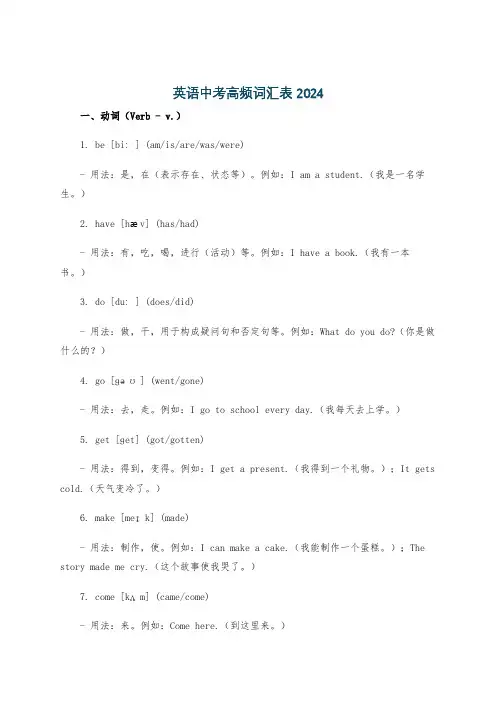
英语中考高频词汇表2024一、动词(Verb - v.)1. be [biː] (am/is/are/was/were)- 用法:是,在(表示存在、状态等)。
例如:I am a student.(我是一名学生。
)2. have [hæv] (has/had)- 用法:有,吃,喝,进行(活动)等。
例如:I have a book.(我有一本书。
)3. do [duː] (does/did)- 用法:做,干,用于构成疑问句和否定句等。
例如:What do you do?(你是做什么的?)4. go [ɡəʊ] (went/gone)- 用法:去,走。
例如:I go to school every day.(我每天去上学。
)5. get [ɡet] (got/gotten)- 用法:得到,变得。
例如:I get a present.(我得到一个礼物。
);It gets cold.(天气变冷了。
)6. make [meɪk] (made)- 用法:制作,使。
例如:I can make a cake.(我能制作一个蛋糕。
);The story made me cry.(这个故事使我哭了。
)7. come [kʌm] (came/come)- 用法:来。
例如:Come here.(到这里来。
)8. take [teɪk] (took/taken)- 用法:拿,取,花费(时间)等。
例如:Take this book.(拿这本书。
);It takes me an hour to go to school.(我上学花费一个小时。
)二、名词(Noun - n.)1. time [taɪm]- 用法:时间,次数。
例如:What time is it?(几点了?);I have been there three times.(我去过那里三次了。
)2. student ['stjuːdnt]- 用法:学生。
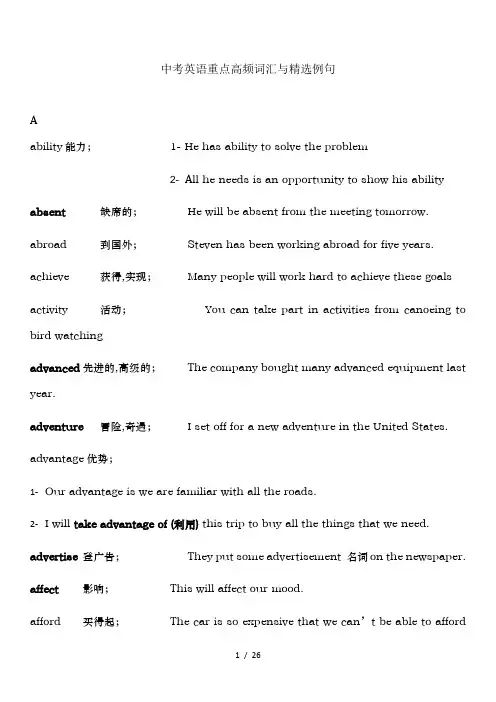
中考英语重点高频词汇与精选例句Aability 能力;1- He has ability to solve the problem2- All he needs is an opportunity to show his ability absent 缺席的;He will be absent from the meeting tomorrow. abroad 到国外;Steven has been working abroad for five years. achieve 获得,实现;Many people will work hard to achieve these goals activity 活动;You can take part in activities from canoeing to bird watchingadvanced先进的,高级的;The company bought many advanced equipment last year.adventure冒险,奇遇;I set off for a new adventure in the United States. advantage优势;1-Our advantage is we are familiar with all the roads.2-I will take advantage of (利用) this trip to buy all the things that we need. advertise登广告;They put some advertisement 名词on the newspaper. affect影响;This will affect our mood.afford 买得起;The car is so expensive that we can’t be able to affordit.agriculture农业;Agriculture is very important for all the countries. announce 宣布;The director announced that we had won the competition.anxious 焦虑的,渴望的;He is very anxious to go aboard.apologize道歉;I need to apologize for what I did.appearance出现,外表;1-It was the president's second public appearance to date2-She care about her appearance very much.appreciate感激,欣赏;We appreciate what you did for us.astronaut 宇航员;I saw an astronaut driving the spacecraft. atmosphere大气,气氛;very good atmosphere 很好的气氛或氛围attempt 企图,尝试;We are attempting to persuade him to work for our companyattract 吸引;1-In order to attract the investors, Chinese government has reduced the taxes. audience听众;All the audience were attracted by his performance. Average 平均;The yearly average income of individual in China is 8000 USDappetite 食欲;He has very good appetite recently.attitude 态度;The waiter in the restaurant has very good attitude to the customers.★Bbalance 平衡;The medicines you are currently taking could be affecting your balancebargain 讨价还价;We always bargain with the sellers in the market. basic基本的;基础的We provide 2-person tents and basic cooking and camping equipmentbenefit 利益;Both parties have benefited from the project. beyond 超过;This is beyond our capability.1-The situation is beyond her control. Or out of control.biology 生物学;Biology is one of the most important basic subject. bitter苦的;The leaves taste rather bitter.branch分支,部门;the company has many branches in the world. broadcast广播,播送;1-In a broadcast on radio the government also announced that it was willing to resume peace negotiationsbehavior行为;His behavior is not suitable in this important occasion. belief信仰,信念;We need to insist our belief.★Ccamera 照相机;Camera is used to take pictures.capital 首都,省会;Beijing is the capital of China.captain 队长,船长;John used to be the captain in U.S.Aceiling天花板;It is difficult to touch the ceiling because it is too high. celebrate 庆祝;We will celebrate the birthday of company.century 世纪;chain链子;连锁;Wal mart is the biggest chain shop in the world. challeng e 挑战;It is big challenge for his to climb the high mountain. channel 航道,海峡,频道;Please adjust the channel to receive the signal that we send.character 特征;Her behavior last night revealed a lot about her charactercharge 收费,索价;1- free charge, 免费2- We need to charge my mobile phone.chat聊天;Would you like to chat with me by the phone. Christmas 圣诞节;Christmas is the most important date for the western.citizen公民;All the citizens have the right to vote for president electioncigarette 香烟; A lighted cigarette burned a hole in his clothes.climate 气候;The climate has been becoming hotter obviously in recently years.coal 煤炭;The price of coal has reduced dramatically since last year.collar衣领;Some new designed jacket has no collar.Comfortable舒适的; A home should be comfortable and friendly.This sofa is very comfortable for the fat man to sit on. Communication 交流,通讯 It is very important to communicate with friends competition竞赛;He will be banned from international competition four years.complete完全的,彻底的;I have done the homework completely. composition作文;There is going to be the composition in the English exam.concert音乐会I've been to plenty of live rock concertsconductor售票员,(乐队)指挥,导体;The train conductor punched (打眼) our tickets.Wood is a poor conductor 导体of heat and electricity. confident自信的;John is very confident that he will win the race. congratulation祝贺;construction建设;The road construction is in progress.continent大陆,大洲;She loved African continent.convenient方便的;Is it convenient for you to come to my office right now?conversation交谈;We had a good conversation last night.cough咳嗽;started coughing blood so they transferred me to a hospital.course过程,课程,一道菜;English coursecourage勇气;He is short of courage to face the difficulties. cousin堂(表)兄弟,堂(表)姐妹;crowd人群;curtain窗帘;The curtain is used to prevent the light from entering the room.culture 文化;curious好奇的;Children are naturally curious 孩子天生就好奇custom习俗;The custom of lighting the Olympic flame goes back centuriescustomer消费者;顾客All the waiters need to respect the customers. Conclusion结论;He made the final conclusion that Peter had passed the exam.contribution贡献;John made great contribution to the country.Ddaily每日的;The daily price has increased by 50%.decade十年;British Rail has become more commercial over the past decadedefinitely明确地,肯定地;I'm definitely going to get in touch with these people deliver 投递;All the packages of rice have been delivered to my house. Declare 宣布;John declared that he would give up the competition. deserve 应受,值得;It's your money, you work very hard, so you deserve it.description 描述;Please describe what you saw last night.design 设计;The company has designed a beautiful building. devote 专心,致力于;He decided to devote the rest of his life to scientific investigationdetermine 决心,决定;The size of the chicken pieces will determine the cooking timedialogue/dialog对话;They have begun dialogues to promote better understanding between both communitiesdirection 方向;指导;Langfang city is located in the opposite direction disaster 灾难;It was the second air disaster in the region in less than two monthsdisappear 消失;John drive the car very fast, the car disappeared in two minutes.discussion 讨论;we will discuss about this issue tomorrow.disturb 打扰;Don’t disturb him, he is studying in his room. diary 日记;He insist on writing the diary.digital 数码的;Digital camera is very popular in recent years. download 下载;You need to download some software to run it.dustbin 垃圾箱;We need to put more and more dustbin in the yard. decrease 减少;Population growth is decreasing by 1.4% each year department部,科;系;We are working in the same department.dynasty 王朝,朝代;The Ming dynasty of China was founded hundreds years ago.★Eeconomical经济的,节约的;It is more economical to wash a full loadeducate 教育;He was educated at No.3 middle Schooleffective 有效的The new rules will become effective in the next few days efficient 效率高的;you need to be more efficient when you do your homework.effort 努力;John made great effort to finish his job on time. electricity 电;Electricity was invented by a famous scientist. equality 平等;They live and work together in complete equality encourage 鼓励;Peter encouraged Steven to study hard.energy 能量;精力;He always has enough energy.entrance 入口;There are five entrances in this building.envelope 信封;environment环境;we need to take measures to protect our environmentescape 逃避;It is very difficult to escape from the prison. especially 尤其,特别;exhibition 展览会;There are many different cars in the car exhibition. Expert 专家;He is petroleum expertExtremely 极端地;My mobile phone is extremely usefulEventually 最终地;Eventually, the army caught up with him in Langfang city.★FFamiliar 熟悉的;We are very familiar with EuropeFailure 失败;Failure is the mother of success.Finger 手指;flour 面粉;Bread is made of flourfluently 流利地;He can speak English very fluently.forbid 禁止;Smoking is forbidden in this room.foreigner 外国人;Perter is a foreignerforgive 原谅;Please forgive me for forgetting your name. fortunately 幸运地;Fortunately, He passed the English exam.freedom 自由;freedom is most important right for the human being.frequent 频繁的;He makes mistake frequently.fresh 新鲜的;I like to eat fresh fruits.fruit 水果;friendly 友好的;He is very friendly to mefuel 燃料;The plane was running out of fuel.furniture 家具;We need to buy furniture for the new house. Festival 节日;October 1st is most important festival day.★GGeneration 一代;the new generation has different idea about life. Generally 一般地;Generous 慷慨的;大方的;He has been very generous to his friends. Geography 地理;We need to know some knowledge about geography.Glove 手套;Government 政府;The government shall be responsible for graduation 毕业;I graduated from Beijing University.gradual 逐渐的;Losing weight is a slow, gradual processgrammar 语法;You need to master the grammar.Guest 客人;We need to respect our guests.Guide 导游;He has been a guide for 10 years.★Hhabit 习惯;I have a good habit, I get up very early. Handkerchief 手帕;Handwriting 书法,笔迹;harvest 收获;There were 3 million tons of grain in the fields at the start of the harvest.height 高度;The height of this mountain is 600 meters.honor 尊敬;it is my great honor to see you.hunger 饥饿;Hunger is very common in Libya.humourous 幽默的;Peter is very humourous when he teaches me English.★IIsland 岛;He lives in a small island.Imagine 想象;You can’t imagine how beautiful the island is. immediately 立即,立刻;He will come immediately if you call him. increase 增加;My salary has increased dramatically.Income 收入;Industry 工业,勤劳;Industry and agriculture are the two important sectors of the national econom yLight industry is closely related to agriculture.Inform 通知;I was informed to come to the office immediately. Internet 因特网;Interview 采访,面试;When I went for my first interview for this job I arrived extremely early Interrupt 打断,打扰;Don’t interrupt other people when they are talking.Inventor 发明者;Edison is the inventor of electric lamp.Insurance 保险;We need to buy insurance for our new car.★JJournalist 记者; A journalist interviewed me yesterday.Judge 审判,判断,法官;I judged him to be about fortyJustice 正义,公正;法官He has a sense of justice. 他有正义感。
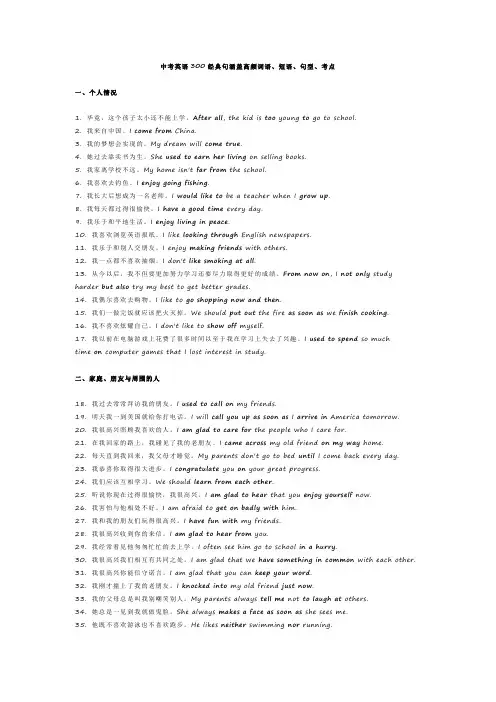
中考英语300经典句涵盖高频词语、短语、句型、考点一、个人情况1. 毕竟,这个孩子太小还不能上学。
After all, the kid is too young to go to school.2. 我来自中国。
I come from China.3. 我的梦想会实现的。
My dream will come true.4. 她过去靠卖书为生。
She used to earn her living on selling books.5. 我家离学校不远。
My home isn't far from the school.6. 我喜欢去钓鱼。
I enjoy going fishing.7. 我长大后想成为一名老师。
I would like to be a teacher when I grow up.8. 我每天都过得很愉快。
I have a good time every day.9. 我乐于和平地生活。
I enjoy living in peace.10. 我喜欢浏览英语报纸。
I like looking through English newspapers.11. 我乐于和别人交朋友。
I enjoy making friends with others.12. 我一点都不喜欢抽烟。
I don't like smoking at all.13. 从今以后,我不但要更加努力学习还要尽力取得更好的成绩。
From now on, I not only study harder but also try my best to get better grades.14. 我偶尔喜欢去购物。
I like to go shopping now and then.15. 我们一做完饭就应该把火灭掉。
We should put out the fire as soon as we finish cooking.16. 我不喜欢炫耀自己。
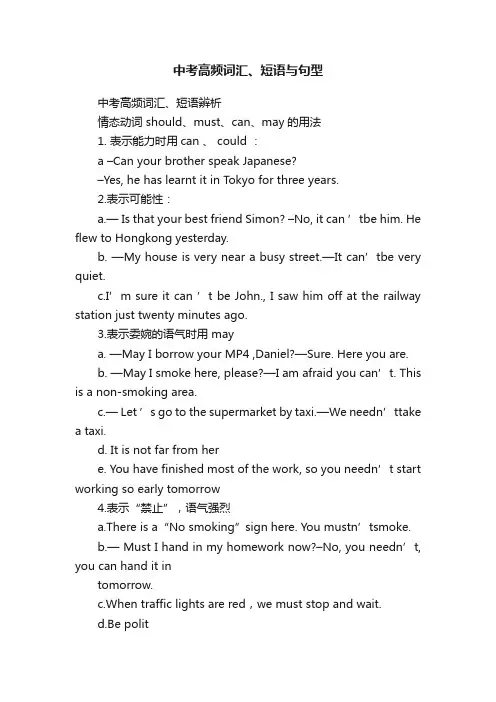
中考高频词汇、短语与句型中考高频词汇、短语辨析情态动词 should、must、can、may的用法1. 表示能力时用can 、 could :a –Can your brother speak Japanese?–Yes, he has learnt it in Tokyo for three years.2.表示可能性:a.— Is that your best friend Simon? –No, it can ’tbe him. He flew to Hongkong yesterday.b. —My house is very near a busy street.—It can’tbe very quiet.c.I’m sure it can ’t be John., I saw him off at the railway station just twenty minutes ago.3.表示委婉的语气时用 maya. —May I borrow your MP4 ,Daniel?—Sure. Here you are.b. —May I smoke here, please?—I am afraid you can’t. This is a non-smoking area.c.—Let ’s go to the supermarket by taxi.—We needn’ttake a taxi.d. It is not far from here. You have finished most of the wo rk, so you needn’t start working so early tomorrow4.表示“禁止”,语气强烈a.There is a“No smoking”sign here. You mustn’tsmoke.b.— Must I hand in my homework now?–No, you needn’t, you can hand it intomorrow.c.When traffic lights are red,we must stop and wait.d.Be polite. You mustn't talk to the old like that.e. — Must I park my car behind the building?—No, you don't have to. Youmay park it here.have gone to/ have been to1.— The Blacks have gone to the Phoenix Island(凤凰岛).—Oh, really? I have neverbeen there before.2.— Where is Jim?3.— Is that girl Amy?— He has gone to the computer room.—No, she ’s Allen. Amy has gone to the library with her friend.4.— I want to return the book to Jack, but I can't find him.You can find him there.1.Mr Wu is away on holiday. He has gone to Shanghai.2.Kitty ’s uncle has been to Beijing twice.3.We have been good friends for more than ten years.4.How many times have you been to Yangzhou?— He has gone to the library.频率副词1.—Did you play badminton yesterday?—Yes. But I never play badminton thesedays because my right foot hurts.2.He learns all by himself. He never goes to any training class.3.Alice seldom watches the news round-up, so she knows little about the world.4.I hate vegetables. I seldom eat them.the other 、others 、another 、other1.This coat is too large. Would you please show me another one?2.I know there is a pen in your right hand. But what’s in your other (另一个)hand?3.she is always ready to help others.4.This morning Jack came to school much later than any other student in his class.5.We had a picnic last term and it was a lot of fun, so let’s have another one this month.6.If the question is answered incorrectly, another question will be given to you.Put on; take off ;Turn on/ off;turn up/ down1.Bob, put on your coat. It’s cold outside.2.The man took off his coat as soon as he walked into the warm room..3.Tom, take off your T-shirt right now! It looks so dirty.4.Don ’tforget to turn off the lights when you leave the room.5.The music from the radio sounds so beautiful. Could you please turn up the radio a little?6.Would you please turn down the TV a little? Jack is doing his homework.both, either,neither1.—Did your parents go to climb the Zijin Mountain last Sunday?— No They both went to see a film .2.—Would you like some juice or milk?—Either is OK. I don’tmind.3.There are two ways from here to the station. You can go either way.4.Would you like some coffee or tea? Neither , water is OK.5.Neither of them knows French, so I have to ask a third person for help.a few, few, a little ,little1.You ’ve done a good job. You made few mistakes.2.There ’s little cooking oil left in the house. Would you go to the supermarket and getsome ?3.I can ’tbuy the dress because I have just a little mon ey.4.We ’ll try our best to do the work with less money and fewer people.look at / for/ up/ after1.Parents, attention please. It’s very crowded here. Look after your kids.2.The English—Chinese dictionary helps me a lot. I often look up new words in it.3.Look up the word in the dictionary,and you’ll get the meaning by yourselves.because,because ofYangzhou is more suitable for people to live in because of less air pollution.living & aliveJin Yong is one of the greatest and oldest living writers. He is still alive.surprised; amazing ;boring1.In the Science Museum, the children felt surprised to see so many amazing things.2.The film is boring, it makes me want to sleep.sometime 在某个时间;some time 一段时间;sometimes 有时候 ;some times 几次They are going to have a picnic sometime next week.except & besides— Why did you all go swimming exceptTom?—Because hewas ill at home.Until& not ?until1.They watched the train until it disappeared in the distance.2.You won ’tget the result of the test until the end of t his month.3.The teachers did not leave the school until all the students had gone home.A number of & the number of1.The number of the teachers in their school is about 200 anda number of them are women.2.— What is the number of the students in your school?—About two thousand. A number of them are from England.used to do& be used to doing1.Mr Smith told me that he wasn’tused to travelling by plane and he used to feel sicka lot.2.Ben is used to reading English (习惯于读英话) for half an hour after he gets up in the morning.3The Smiths are used to getting up early.4.Susan ’s father used to go fishing.5.He used to live in a small village, but now he has been used to living in the big city.6.My grandpa used to play the violin after dinner, but now he is used to playing chess with me.Would rather do than do & prefer?to?1.I would rather do some reading than chat online at weekends.2.He would rather read books at home than go hiking.3.What a heavy rain! I prefer watching TV to going out on such a rainy day.4.他宁可在家听音乐: He prefer to listen to music at home.中考词汇部分高频词1.名词:1)tion 结尾(兼顾复数):inventions 、description 、invitations 、 organizations2)规则、不规则复数变化(极可能考复数形式):potato —potatoes 、tooth — teeth 、leaf — leaves 、 wife — wives3)后缀名词: players 、 villagers4)转化来的名词: fly — flight 、choose — choice 、greet —greeting 、important — importance、different — difference 、develop — development 、advantage — disadvantage 、win —winner ’s、smoke — smoking 、 hear —hearing 、 decide —decision5 )其它: robot 、 sunglasses 、energy 、 fans 、 mistakes 、basketball 、dream 、photos 、century 、fruits 、water 、reason 、corner 、traffic 、manners 、professor ’s、languages 、spacemen 、 news 、 end 、 sky 、 duty2.动词:accept 、doubt 、took 、taught (多次出现)、 replying 、beat 、guess 、agreed with 、afford(多次出现)、interview 、happened 、watch 、write 、Allowed 、 open 、 waste 、 disturbed 、checked 、recorded 、turned 、made 、imagine 、described 、waste 、refused 、lying 、breathe 、held 、paid 、surprise 、spent 、change 、heard from 、tastes 、refused 、weighed 、injured 、treat 、to give 、supposed 、rains 、would come、is ringing、shall/ will/ am going to stay、was sent 、have 、be planted、 beginning/to begin、to choose、passed 、rises 、was taken、to close 、will be held/are going to be held、waschatting 、was asked 、was trying 、am considering 、punishing 、to play 、can/will clean 、make 、failed 、discover 、to go 、were waiting、realized 、left 、were working、was found 、will be 、ran 、got 、started 、to buy 、were taken、will come/is coming/should come、looked、returns、to move / moving、has missed 关于动词,要立足于最常用的部分,但非谓语动词和各种时态、语态变化却是训练时必不可少的,单纯记忆孤立的单词基本没有什么作用。

[短语、词组归纳]由动词开头构成的短语、词组很多。
复习时应分类处理:一、动词+介词1.look at…看…,look like … 看上去像……,look after …照料… 2.listen to…听……3.welcome to…欢迎到……4.say hello to …向……问好5.speak to…对……说话此类短语相当于及物动词,其后必须带宾语,但宾语无论是名词还是代词,都要放在介词之后。
二、动词+副词“动词+副词”所构成的短语义分为两类:A.动词(vt.)+副词1.put on 穿上 2.take off脱下 3.write down记下此类短语可以带宾语,宾语若是名词,放在副词前后皆可;宾语若是人称代词,只能放在副词的前面。
B.动词(vi)+副词。
1.come on赶快 2.get up起床 3.go home回家4.come in进来 5.sit down坐下 6.stand up起立此类短语属于不及物动词,不可以带宾语。
三、其它类动词词组1.close the door2.1ook the same3.go to work/class4.be ill5.have a look/seat6.have supper7.1ook young 8.go shopping 9.watch TV/games10. play games[介词短语聚焦]“介词+名词/代词”所构成的短语称为介词短语。
现将Unitsl-16常用的介词短语按用法进行归类。
1.in+语言/颜色/衣帽等,表示使用某种语言或穿着……。
2.in + Row/ Team/ Class/ Grade等,表示“在……排/队/班级/年级”等。
3.in the morning/ afternoon/ evening/ 表示“在上午/下午/傍晚”等一段时间。
4.in the desk/ pencil-box/bedroom 等表示“在书桌/铅笔盒/卧室里”。
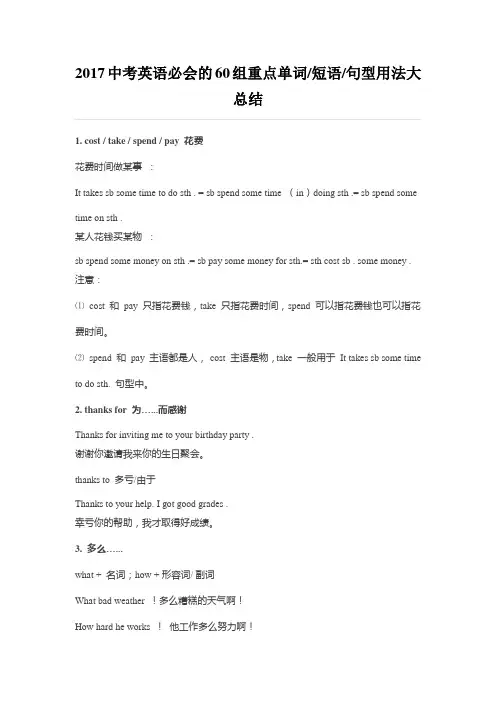
2017中考英语必会的60组重点单词/短语/句型用法大总结1. cost / take / spend / pay 花费花费时间做某事:It takes sb some time to do sth . = sb spend some time (in)doing sth .= sb spend sometime on sth .某人花钱买某物:sb spend some money on sth .= sb pay some money for sth.= sth cost sb . some money .注意:⑴cost 和pay 只指花费钱,take 只指花费时间,spend 可以指花费钱也可以指花费时间。
⑵spend 和pay 主语都是人,cost 主语是物,take 一般用于It takes sb some time to do sth. 句型中。
2. thanks for 为…...而感谢Thanks for inviting me to your birthday party .谢谢你邀请我来你的生日聚会。
thanks to 多亏/由于Thanks to your help. I got good grades .幸亏你的帮助,我才取得好成绩。
3. 多么…...what + 名词;how + 形容词/ 副词What bad weather !多么糟糕的天气啊!How hard he works !他工作多么努力啊!What fresh vegetables !多么新鲜的蔬菜啊!How cute a monkey it is !它是一只多么可爱的猴子啊4 . 因为......;由于......because(连词)+从句because of(介词短语)+ 名词(短语)I didn’t go to school because I had a headache.因为我头疼,所以我没去上学。
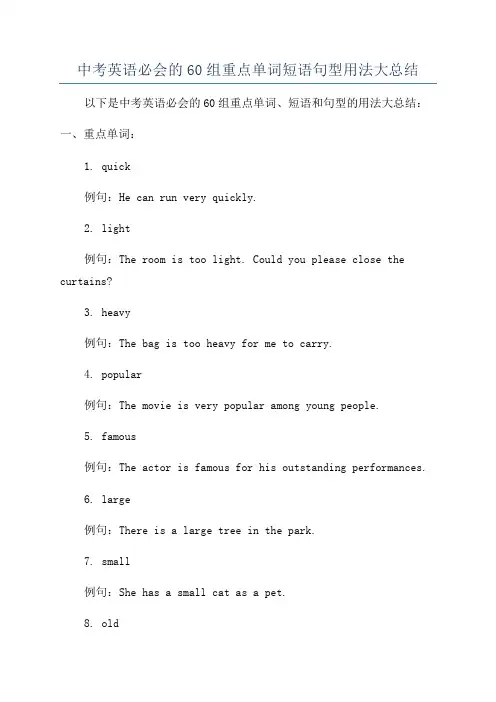
中考英语必会的60组重点单词短语句型用法大总结以下是中考英语必会的60组重点单词、短语和句型的用法大总结:一、重点单词:1. quick例句:He can run very quickly.2. light例句:The room is too light. Could you please close the curtains?3. heavy例句:The bag is too heavy for me to carry.4. popular例句:The movie is very popular among young people.5. famous例句:The actor is famous for his outstanding performances.6. large例句:There is a large tree in the park.7. small例句:She has a small cat as a pet.8. old例句:My grandfather is 80 years old.9. young例句:He is too young to drive a car.10. beautiful例句:The sunset is so beautiful.11. ugly例句:The painting is very ugly.12. clean例句:Please keep your room clean.13. dirty例句:His clothes are dirty after playing in the mud. 14. hard例句:It's hard for me to solve the math problem.15. easy例句:The question is very easy. I can answer it easily.16. good例句:He is a good student. He always gets high marks.17. bad例句:He is a bad boy. He always causes trouble.18. young例句:He is too young to drive a car.19. old例句:My grandfather is 80 years old.20. high例句:The mountain is very high.21. low例句:The temperature is very low today.22. deep例句:The river is deep. Be careful when swimming.23. thin例句:She is very thin. I'm worried about her health. 24. fat例句:He is too fat. He needs to go on a diet.25. long26. short例句:The dress is too short. I need to buy a longer one.27. happy例句:She is very happy because she won the game.28. sad例句:The boy is sad because he lost his toy.29. helpful例句:Thank you for your helpful advice.30. careful例句:Please be careful when crossing the road.二、重点短语:1. get up例句:I usually get up at 7 o'clock in the morning.2. go to bed例句:You should go to bed early to get enough sleep.4. get on例句:Please get on the bus quickly.5. get off例句:We need to get off at the next stop.6. take off例句:You need to take off your shoes before entering the house.7. put on例句:She put on her coat because it was cold outside.8. turn on9. turn off例句:Don't forget to turn off the lights when you leave the room.10. look after例句:Can you please look after my cat while I'm away?11. take care of例句:She takes good care of her little sister.12. make up例句:They had a fight yesterday, but they made up this morning.13. break up例句:They broke up after dating for three years.14. try on例句:You can try on this dress to see if it fits you.15. try out例句:He is trying out for the school basketball team.16. give up例句:Don't give up easily. Keep trying and you'll succeed.17. get along (with)例句:She gets along very well with her classmates.18. look for例句:I'm looking for my keys. Have you seen them?19. take off例句:You should take off your hat when you enter a building.20. put on例句:Please put on your seatbelt before the plane takes off.三、重点句型:1. There is/are...例句:There is a book on the table.2. How many/much... are there?例句:How many apples are there in the basket?3. What's the weather like?例句:What's the weather like today? Is it sunny?4. What's your favorite...?例句:What's your favorite color? Mine is blue.5. What do you think of...?例句:What do you think of the movie? I think it's great.6. How often do you...?7. How long does it take to...?例句:How long does it take to get to school? It takes about 20 minutes.9. How do you get to...?例句:How do you get to the library? I usually take a bus.10. What's your hobby?例句:What's your hobby? My hobby is playing the piano.以上是中考英语必会的60组重点单词、短语和句型的用法大总结。
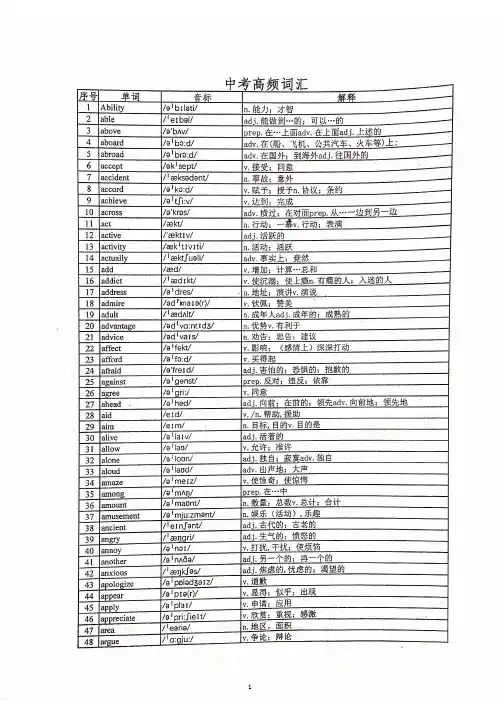
2024break a promise/ break promises break a rule / break rules/20207322022do chores/ housework 2023do exercise/ do sports 73 do/try one’s best 201973202220197275 give a speech /talk 7273722023722023/on /73/201873play a joke/ trick onplay a role / part in732019.29722021.292023722023.35727476742020797275202272make a call / make calls/2020.37make a choice/ make choicesmake a decision / make decisionsmake a dish/ make dishesmake a mistake /make mistakesmake a plan/ make plansmake a rule / make rulesmake a wish / make wishesmake one’s /the bed7276201920182019try/ do one’s best 2019 walk along / down 72pass/walk by202172727320187272take a break /take breaks/ take a rest72/ take photostake a risk/ take risks2018take a vocation/ holiday72202278come from /be from 73die from/of74keep/stay away from742022.242022.24732018.332022.2420202023.42747107572/20232020.83722022look down/ upon / on2021.2975767672202320237274202373201920212017.332021.29722022call/ ring2020732021join in / take part in 7102017.382017732021die of/from76speak/ think highly of727272201976 72202073722020202372737672722022say goodbye / hello/sorry to //202072begin/ start with20182022along/on /73keep/stay in touch with 20192018.3672752021.28722021.292022.32201820182022.24727220212019.29 722018.332022.242023732023742019201920192017Plant/ grow vegetables 2022.7522013. 73 Change one’s mind/ ideasDrive sb mad / crazy722019.31on weekends / on the weekend on the /one’s way to ...by air / by plane乘公共汽车by subway/ by underground by accident/ by chance75In all/ in short/ in a word 2018共同;共有;20192018.2720217273在公共场合;公开地总共2021.30In/at the beginning201875as for/as tofor example /such as 710201771420172022around the world / all over the world75with the help of sb / with one’s help2018.4273be angry at /with sbat/2022.877 6be mad at/with sb727272go to the /a doctorholiday/ vacation72Be disappointed in /with sb Be/become2023.3376Be strict in /about/be certain /sure of722023.302022.342017.237220222020.3072be strict about/inbe sure/certain about2023.33be famous /known/well-201772famous/known/well-2019.33be friendly/ good/kind/nice to/be angry with/at sbbe disappointed with / in sb20192017.27be satisfied /pleased with 2017.2773have /get a chance202020187272follow/obey the rule make a rule / rules on the /one’s way to...732022737773 2018.4272put up/ raise one’s hand2018722023721. 2. 3. 4. 5.6. 7. 8. 9.10.1.2.3.4.5.6.7.8.9.10.。
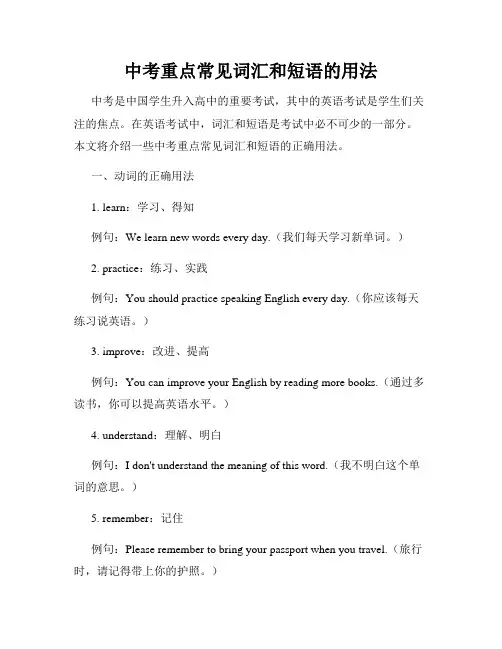
中考重点常见词汇和短语的用法中考是中国学生升入高中的重要考试,其中的英语考试是学生们关注的焦点。
在英语考试中,词汇和短语是考试中必不可少的一部分。
本文将介绍一些中考重点常见词汇和短语的正确用法。
一、动词的正确用法1. learn:学习、得知例句:We learn new words every day.(我们每天学习新单词。
)2. practice:练习、实践例句:You should practice speaking English every day.(你应该每天练习说英语。
)3. improve:改进、提高例句:You can improve your English by reading more books.(通过多读书,你可以提高英语水平。
)4. understand:理解、明白例句:I don't understand the meaning of this word.(我不明白这个单词的意思。
)5. remember:记住例句:Please remember to bring your passport when you travel.(旅行时,请记得带上你的护照。
)二、名词的正确用法1. exam:考试例句:I have an English exam tomorrow.(我明天有一场英语考试。
)2. grade:年级、分数例句:He is in the fifth grade.(他在五年级。
)3. subject:科目例句:Math is my favorite subject.(数学是我最喜欢的科目。
)4. book:书例句:I borrowed a book from the library.(我从图书馆借了本书。
)5. knowledge:知识例句:Reading can broaden our knowledge.(阅读可以扩大我们的知识面。
)三、形容词和副词的正确用法1. difficult:困难的例句:This math problem is difficult to solve.(这个数学问题很难解。
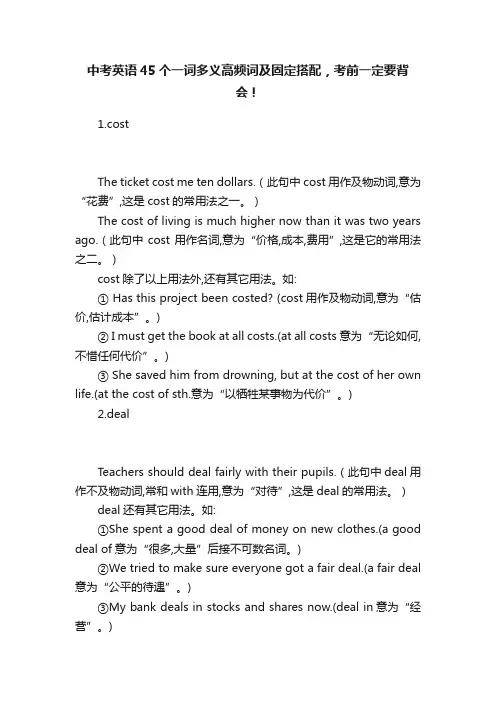
中考英语45个一词多义高频词及固定搭配,考前一定要背会!1.costThe ticket cost me ten dollars.(此句中cost用作及物动词,意为“花费”,这是cost的常用法之一。
)The cost of living is much higher now than it was two years ago.(此句中cost用作名词,意为“价格,成本,费用”,这是它的常用法之二。
)cost除了以上用法外,还有其它用法。
如:① Has this project been costed? (cost用作及物动词,意为“估价,估计成本”。
)② I must get the book at all costs.(at all costs意为“无论如何,不惜任何代价”。
)③ She saved him from drowning, but at the cost of her own life.(at the cost of sth.意为“以牺牲某事物为代价”。
)2.dealTeachers should deal fairly with their pupils.(此句中deal用作不及物动词,常和with连用,意为“对待”,这是deal的常用法。
)deal还有其它用法。
如:①She spent a good deal of money on new clothes.(a good deal of意为“很多,大量”后接不可数名词。
)②We tried to make sure everyon e got a fair deal.(a fair deal 意为“公平的待遇”。
)③My bank deals in stocks and shares now.(deal in意为“经营”。
)④The teacher dealt out the test papers to the students.(deal out意为“分发”。
二.中考必备短语一.同一动词1.break短语break down 崩溃;故障break in 闯入;打断break off 突然停止;暂停break out 突然发生;爆发break up(使)破碎;分解2.call短语call in 召来;叫来call(sb.)back(给某人)回电话call on 号召call up 打电话给(某人);征召call sb. at.. 拨打……(电话号码)找某人e短语come across (偶然)遇见(或发现) come back回来;回想起来come from 来自come in进入;进来come on快点儿come over顺便来访;过来come to oneself 苏醒;恢复知觉come true 实现;成为现实come out 出现;显露;出版;发表;结果是come up with 想出;提出(主意、计划、回答等)4.cut 短语cut down 砍倒cut in 插嘴cut off 切除cut out删除;删去cut up 切碎5.fall短语fall asleep 进入梦乡;睡着fall down 突然倒下;跌倒;倒塌fall in love 爱上;喜欢上fall over 绊倒6.get短语get a surprise 吃惊get angry 生气get away逃离(某地);摆脱(某人) get back返回;回来get close to 接近get down下来;吞下;使沮丧get dressed穿上衣服get good grades/scores 取得好成绩get in 陷入;参与get in the way of... 挡......的路;妨碍get in touch with... 和......取得联系get into the habit of... 养成......的习惯get into trouble 遇上麻烦;陷入困境get lost迷路get mad大动肝火;气愤get married 结婚get off下车get on上车;进展get out 逃离;外出get on/along (well) with和睦相处;关系良好get out of... 离开;逃离;从......出来get out of control 失去控制get over克服get popular 受欢迎;流行get ready for... 为……做准备(=prepare for) get rid of 摆脱get to到达get together相聚get up起床;站起get used to... 习惯于……7.give短语give away 赠送;捐赠give back归还;恢复(健康等)give birth to生孩子;产生give in屈服;让步give off发出(光、热、声音、气味等) give out分发;散发give up 放弃give (sb.) a lift 捎(某人)一程give a speech 发表演讲give a seat to sb. 给某人让座give sb. a hand 给予某人帮助go abroad 出国go away走开;离开go along(the street)沿着(这条街)走go back 回去go boating 去划船go by 时间逝去;经过go camping 去野营go fishing 去钓鱼go for a picnic 去野餐go for a walk 去散步go home 回家go off (闹钟)发出响声go on 继续go on a trip 去旅行go on a vacation 去度假go out外出(娱乐)go out of date 过时go out of one’s way 特地;格外努力go over 仔细检查;复习go shopping 去购物go through 浏览;翻阅;通过go to bed 去睡觉go to school 去上学go to sleep 开始睡觉;入睡go to the/a doctor 去看医生go to the movies 去电影院go upstairs/downstairs 上/下楼9.look短语look after 照料;照顾look around向四周看look at看着look down 向下看look back at 回首(往事);回忆;回顾look down upon/on瞧不起;轻视look for 寻找look forward to盼望;期待look into调查look like 看起来像look out留神;当心look out of... 从……朝外看look through快速查看;浏览look over... (仔细)检查;从……上面看look up (在词典、参考书中或通过电脑)查阅;抬头看look up to 钦佩;仰慕(=admire)10.make短语make a call 打电话make a choice 做选择make a difference影响;有作用make a fire 生火make a list 列清单make a living谋生make a mess弄得一团糟(一塌糊涂)make a mistake 犯错make a plan 制定计划make a promise 许诺make a speech 做演讲make a wish许愿make an effort/efforts作出努力make dinner 做晚饭make dishes 做菜make...feel at home 使......感到宾至如归make friends结交朋友make money 挣钱make (a) noise/make noises 制造噪音make one's bed铺床make one's mind某人下定决心make one's own decision 自己做决定make one’s way 前往;费力地前进make progress取得进步make rules 制定规则make sense 讲得通;有道理make soup 做汤make sure 确保;查明make up 编造(故事、谎言等)make use of 使用,利用11.put短语put... away把……收起来put down记下;镇压;放下put off推迟put on增加(体重);发胖put out熄灭;扑灭put sth. to good use 好好利用某物put up搭起;举起set off 动身;出发;使爆炸set out 出发;启程set up 建起;设立13.take短语take a message捎个口信;传话take a photo 照相take a rest 休息一会儿take a shower洗淋浴take a trip去旅行take a vacation/holiday 去度假take a walk散步;走一走take action采取行动take after (外貌或行为)像take an interest in... 对……感兴趣take away拿走take back 退还;收回take breaks(take a break) 休息take care当心;小心take care of照顾;处理take down 拆除;往下拽;记录take in 吸入;吞入(体内)take notes做笔记take off 脱下(衣服);(飞机等)起飞take one's temperature 量体温take one’s time 从容进行;慢慢来take one's order点菜take out取出;拿出take over接收;接管take part in参加take place发生;出现take pride in... 为……感到自豪/骄傲(=be proud of) take risks (take a risk) 冒险take sb’s place代替;替换take...seriously 认真对待......take subway乘地铁take the place of 代替,取代take the subway/bus 乘地铁/公交take turns轮流take up (尤指为消遣)学着做;开始做14.turn短语turn down 拒绝turn...into 变成turn off 关掉turn on 接通(电流、煤气、水等);打开同一介词/副词型1.about短语argue about... 为……而争吵care about 关心;在意complain about 抱怨dream about梦到hear about 听说know about了解;知道learn about 了解;学习talk about谈论;讨论;议论think about思考;思索worry about担心;烦恼2.at短语arrive at 抵达knock at 敲laugh at 嘲笑look at看着point at 指着shout at... 冲......大声叫嚷3.away短语blow away 吹走clear away清除drive away 驱车离开;赶走get away逃离(某地);摆脱(某人) give away 赠送;捐赠go away走开;离开move away 搬走;离开pass away去世put... away把……收起来run away 跑开sweep away 扫去take away拿走throw away扔掉;抛弃walk away 步行离开wash away 冲走;洗掉bring back 恢复;使想起;归还call (sb.) back (给某人)回电话come back回来;回想起来get back返回;回来give back归还;恢复(健康等) look back 回顾,回头看pay back 偿还(借款等)shout back喊回去take back 撤消;拿回talk back 回嘴;顶嘴5.by短语be made by... 由.....制成drop by 顺便访问;随便进入go by (时间)逝去;经过pass/walk by 路过;经过6.down短语break down 发生故障calm down 平静下来;镇定下来close down (永久)关闭,关停cut down 砍倒die down 逐渐变弱;逐渐消失fall down 突然倒下;跌倒;倒塌get down下来;吞下;使沮丧let...down 使......失望lie down 躺下look down 向下看look down upon/on瞧不起;轻视pass down 传下来;遗传pull down 拆下;摧毁put down记下;镇压;放下shoot down 射下shut down 停工,关闭sit down 坐下slow down 减速take down 拆除;往下拽;记录turn down拒绝;调低,调小(音量等) write down 写下;记录下7.for短语ask for 请求;恳求(给予) call for 要求;提倡;需要care for照顾;非常喜欢cheer for... 为......加油die for... 为......而死fight for... 为......而战hope for 盼望;希望(得到)leave for... 动身去;到……地方去look for 寻找,寻求pay for付费;付出代价prepare for... 为……做准备search for 寻找;寻求stand for代表wait for等候;等待8.from短语borrow...from... 从......借......come from/be from 来自die from 死于hear from... 接到(某人的)信、电话等keep away from 避免接近;远离learn... from... 向......学习......prevent sb./sth. from 阻止某人/某物做某事protect... from... 保护......免受......的侵害run away from 逃离;逃避separate from 分离;隔开stay away from 远离;躲避stop... from doing sth. 阻止......做某事9.in短语arrive in 到达believe in 信任;信赖break in 突然闯入;打断call in 召来;叫来come in进入;进来cut in 插嘴;干预fill in 填补;填写get in 陷入;参与give in屈服;让步hand in 上交;提交;呈送join in / take part in 参加take an interest in... 对……感兴趣take in 吸入;吞入(体内)take part in参加take pride in... 为……感到自豪/骄傲(=be proud of)10.into短语divide... into 把......分成fall / drop into 落入;陷入get into 陷入;参与knock into... 与......相撞look into调查rush into 冲入translate......into 把.....翻译成turn into变成walk into 走路时撞上11.of短语be made of... 由......制成/组成come out of... 从......出来die of 死于dream of 梦想;梦见get hold of 抓住get out of... 离开;从......出来hear of 听说look out of... 从……朝外看remind sb. of sth. 使某人想起某事run out of 用尽;耗尽take care of 照顾;处理take the place of 代替,取代think of 认为;想起12.off短语break off 突然停止;中断cut off 切除clean off 把……擦掉cool off 冷静下来;使变凉fall off... 从......掉下来get off下车give off发出(光、热、声音、气味等)go off (闹钟)发出响声keep off 避开;(雨、雪等)没有下;回避某话题kick sb. off 开除某人pay off 还清(欠款等)put off 推迟see...off 为......送行set off 出发show off炫耀;卖弄shut off 关闭;停止运转start off 出发,开始take off 脱下(衣服);(飞机等)起飞turn off 关掉13.on短语agree on... 对......取得一致意见carry on 继续come on快点儿depend on 依靠;依赖fight on 坚持,继续奋斗focus on 致力于;使聚焦于go on 继续hold on 等一等(别挂电话)keep on 坚持knock on 敲land on 着陆;登陆live / feed on... 以......为食look down upon/on瞧不起;轻视pass on 传递put on增加(体重);发胖try on 试穿turn on 接通(电流、煤气、水等);打开work on 从事;忙于14.up短语break up 粉碎;破碎bring up养育;抚养call up 打电话给(某人);征召cheer up (使)变得更高兴;振奋起来clean up打扫(或清除)干净climb up 攀登;升高cut up切碎dress up装扮;乔装打扮drink up 喝光eat up 吃光end up最终成为;最后处于fix up 修理;装饰get up 起床;站起give up 放弃go up 上去grow up长大;成熟;成长hang up挂断(电话)heat up 使变热;加热hurry up 赶快;急忙(做某事) lift up 举起;抬起light up 照亮line up 排列;排队look up (在词典、参考书中或通过电脑)查阅;抬头看make up 编造(故事、谎言等)mix up 混合在一起pick up接电话put up 搭起;举起ring up 打电话set up建起;设立show up赶到;露面speak up 大点儿声说;大胆讲stand up 起立;(论点、论据等)站得住脚的;经久耐用的stay up深夜不睡;熬夜take up (尤指为消遣)学着做;开始做think up 想出turn up 调高(音量);出现use up 用完;耗尽wake...up把……弄醒warm up 热身;做准备活动15.out短语blow out吹灭break out (战争、火灾等)突然发生;爆发bring out 使显现;使表现出call out 呼唤check out察看;观察clean... out清除;把……打扫干净clear out清理;丢掉come out 出来;出版cry out 呐喊;呼喊cut out删除;删去die out 灭绝;消失eat out出去吃饭figure out 计算出;弄明白find out 查明;弄清(情况)get out of 离开;从……出来go out外出(娱乐)hand out分发hang out闲逛;常去某处help out (帮助……)分担工作、解决难题lay out摆开;布置leave out 忽略;不提及;不包括look out 当心;注意;向外看point out指出put out 扑灭;熄灭reach out 伸出run out (of) 用尽;耗尽sell out 卖光send out 发送;派遣set out出发;启程take out取出;拿出try out 参加选拔;试用work out成功地发展;解决16.over短语come over顺便来访;过来fall over 绊倒get over克服go over 仔细检查;复习look over... (仔细)检查;从……上面看take over接收;接管think over 仔细考虑run over to 跑到turn over翻身;翻转17.to短语according to依据;按照add to sth. 增加某物belong to sb. 属于某人compare... to... 把.....比作,把......比喻为...... dance to music 随着音乐起舞express... to... 向......表达......get to到达help oneself to... 请随便吃/喝......hold on to 继续;坚持;保持lead to 导致;通向lend... to... 把......借给......listen to 听live up to 活到look forward to期待;盼望look up to 钦佩;仰慕(=admire)point to 指向(远处)say sorry/goodbye to sb. 向某人道歉/道别shout to... 对......大声喊叫speak to sb. 对某人说话spread... to... 向......传播......stick to坚持;固守talk to sb. 跟某人说used to (do) 过去常常(做)write to sb. 给某人写信18.with短语agree with... 同意;和……意见一致argue with... 和……争吵begin with... 以……开始break up with... 跟……分手;与……断绝关系catch up with赶上;跟上come up with 想出;提出(主意、计划、回答等) communicate with sb. 和某人交流compare...with... 比较...;对比... connect...with... 把……和……连接或联系起来deal with 应对;处理do with 处理(与what连用)end up with... 以......结束fall in love with爱上fight with... 与......打架fill with 装满,充满get on/along (well) with和睦相处;关系良好have to do with... 关于;与……有关系help (sb.)with sth. 在某方面帮助(某人)keep in touch with... 与……保持联系make friends with 与......交朋友part with放弃;交出(尤指不舍得的东西) play with... 玩......;和......玩耍provide...with... 为……提供……share... with... 与......分享......stay with sb. 和某人待在一起talk with sb. 与某人交谈形容词短语1.be+adj.+about短语be careful about…对……小心be crazy about…对……疯狂be excited about… 对......感到兴奋be nervous about… 因......而紧张be pleased about… 因......感到高兴be sad about… 为......而难过be serious about… 对......是认真的be sorry about… 对......感到抱歉be sure about… 确信;对……有把握be worried about…对……感到担心2.be+adj.+at短语be amazed at…对......感到惊讶be angry at…因......而生气be good at… 擅长于……be mad at…对……生气be surprised at…对……感到惊讶3.be+adj.+for短语be bad for…对……有坏处be famous/known for… 因……而著名be good for…对……有好处be late for迟到be necessary for…对......有必要be/get ready for…为……做准备(=prepare for) be responsible for… 对……有责任;负责任be short for… 是……的简称;是……的缩写be sorry for…对……感到抱歉/遗憾be suitable/fit for…适合……be thankful for…因……而感激be thirsty for 渴望;渴求4.be+adj.+from短语be a bsent from…缺席be different from… 与……不同;与……有差异be far from…远离……be separated from…与......分离5.be+adj.+of短语be afraid of…害怕……be ashamed of…对……感到羞愧be careful of… 小心,注意;当心……be fond of…喜欢……be full of… 满是……的;(有)大量的;(有)丰富的be proud of… 为……感到骄傲be short of… 缺少;不到;不够be sure of…对……有把握be tired of…对……感到厌倦6.be+adj.+in短语be born in…出生于be confident in…对......有信心be disappointed in…对......感到失望be interested in…对……感兴趣be rich in…富含......be strict in…对......要求严格be successful in…在......成功be talented in…在......方面有天赋be weak in…在……方面薄弱7.be+adj.+with短语be angry with…生……的气be bored with…对……感到厌烦be born with天生具有be busy with…忙于……be careful with…小心(对待)......be covered with…被......所覆盖be familiar wit h…对……熟悉be filled with充满;装满be friends with sb. 成为某人be patient with…对……有耐心be good with…善于应付……的;对……有办法be pleased with… 对……感到满意be popular with…受……欢迎be satisfied with…对……感到满意be strict with… 对……要求严格介词短语1.as短语as a result 因此;结果as...as... 像......一样......as far as I know 据我所知as for 至于;关于as if 好像as long as 只要;既然as soon as possible 尽快as usual 像往常一样as well 也;还有as you know如你所知2.at短语at a time 每次,一次at birth出生时at first起初;起先at home 在家at last最后;终于at least至少;不少于;起码at most 最多at night 在晚上at once立刻;马上at present目前;现在at school 在上学;在学校at that moment 在那时at that time 那时候at the age of… 在……岁时at the beginning of 在……开始at the bottom of… 在......底部at the end of… 在……末端,到……尽头at the foot of… 在......底部;在......脚下at the moment 此时;现在at the same time 同时at the top of… 在......顶部或顶端at times有时;偶尔at weekends/ the weekend 在周末at work 在工作3.by短语by accident 偶然;意外地(=by chance) by air/ plane 乘飞机by bike 骑自行车by hand 手工by heart 凭记忆;能背诵by mistake 错误地;无意中by oneself 独自地by the end of在(某时间点)以前by the time在以前by the way顺便说(问)一下by train 乘火车by turns 轮流4.for短语for a while 一会儿for example例如(=such as)for sale 待售for sure 无疑;肯定5.from短语across from…在……对面from now on 从今/此以后;今后from then on 从那时起from time to time 时常;有时from... to... 从......到......6.in短语in a hurry 匆忙地in a low voice 低声地in a row 连续几次地in a word 总之in agreement 一致;同意;意见一致in case of 万一in common共同的;共有的in control of 掌管;管理in danger处于危险之中in fact确切地说;事实上;实际上in front of…在......前面(外部)in general 总之,通常;一般而言in good health 健康状况良好in half 分成两半in need 在危难中;在困境中in need of 需要;缺少in one's opinion 依某人看in order整齐;秩序井然in order to目的是;为了in other words 换句话说in pain 痛苦地in peace 和平地in person亲身;亲自in public公开地;在别人(尤指生人)面前in return作为回报in silence沉默;无声in space 在太空中in style流行;时尚地in surprise 惊奇地in that case既然那样;假使那样的话in the distance 在远处in the end最后in the face of面对(问题、困难等)in the front of…在......前面(内部)in the future 在将来in the middle of…在......中间in this way 以这种方式in time及时in total总共;合计in trouble处于困境中(=in need)in turn依次;轮流7.of短语ahead of…在......之前,提前all of a sudden 突然;猛地because of 因为;由于first of all 首先instead of 代替;而不是8.on短语on board在船(火车、飞机)上on business出差on duty值日;值班on fire着火;失火on foot步行on hand 在手边on holiday度假[=on (a)vacation]on one’s own 独自on purpose故意地on sale出售;降价出售on show 展出on the Internet 在网上on the left 在左边on the right 在右边on the one hand... on the other hand... 一方面......另一方面...... on the same day/date 在同一天on the / one’s way to…在某人去......的路上on time准时on weekends/the weekend (在)周末9.to短语according to…根据;按照;据......所说;视......而定close to 接近next to…紧靠......的旁边;贴近;最接近thanks to 多亏;由于to be honest 说实在的to one's surprise 使某人惊讶的是;出乎某人的意料to start with起初;开始时up to 多达。
中考英语中的高频考点词组包括但不限于以下内容:
1. 动词短语:
- look forward to 期待
- carry out 实施
- give up 放弃
- come up with 提出
- put off 推迟
- take part in 参加
2. 形容词短语:
- be fond of 喜爱
- be interested in 对...感兴趣
- be good at 擅长
- be worried about 担心
3. 名词短语:
- a piece of 一片,一件
- a lot of 许多
- a number of 许多
- the number of ...的数量
- the way to ...的方法
- the reason why ...的原因
4. 副词短语:
- as soon as 一...就...
- at first 起初
- in the end 最后
- on purpose 故意地
- by accident 偶然地
5. 介词短语:
- in front of 在...前面
- on the way to 在去...的路上
- at the end of 在...的末尾
- in the middle of 在...中间
- on the other hand 另一方面
这些词组在中考英语中经常出现,并且对于理解阅读材料、写作和口语表达都具有重要作用。
熟练掌握这些高频考点词组将有助于提高英语应试能力。
中考英语高频考点词组一、考点词组及其用法1. be interested in (对……感兴趣)例句:I am interested in playing basketball.2. take part in (参加)例句:He took part in the school sports meet.3. look forward to (期待)例句:We look forward to your visit.4. be good at (擅长)例句:She is good at playing the piano.5. get along with (与……相处)例句:He gets along with his classmates very well. 6. be afraid of (害怕)例句:I am afraid of spiders.7. be different from (与……不同)例句:The two pictures are different from each other.8. be similar to (与……相似)例句:The new phone is similar to the old one.9. be known for (因……而出名)例句:Paris is known for its beautiful architecture.10. be famous for (因……而著名)例句:Michael Jordan is famous for his basketball skills.二、用法示例1. be interested in (对……感兴趣)A: What are you interested in?B: I am interested in playing the guitar.2. take part in (参加)A: Are you going to take part in the school play?B: Yes, I am. I will be performing a dance.3. look forward to (期待)A: Are you excited about the summer vacation?B: Yes, I am. I look forward to traveling with my family.4. be good at (擅长)A: What are you good at?B: I am good at swimming.5. get along with (与……相处)A: How do you get along with your classmates?B: I get along with them very well. We are good friends.6. be afraid of (害怕)A: Are you afraid of spiders?B: Yes, I am. I don't like them at all.7. be different from (与……不同)A: How is your new school different from your old one?B: My new school is bigger and has more facilities.8. be similar to (与……相似)A: Is this movie similar to the book?B: Yes, it is. They have the same storyline.9. be known for (因……而出名)A: What is London known for?B: London is known for its historical landmarks and multiculturalism.10. be famous for (因……而著名)A: What is Florence Nightingale famous for?B: Florence Nightingale is famous for her contributions to modern nursing.三、总结本文介绍了中考英语中的高频考点词组及其用法。
中考英语高频单词343个与词组361个一、中考英语高频单词343个1.accept vt./ vt. 接受;承认;容纳同意2.achieve vt. 完成;达到 vi. 达到目的3.act v.行动,表演4.admire vi./vt. 钦佩;赞美5.afford vt. 给予,提供;买得起6.affect vt.影响,感动7.agreement n.协定,协议,同意8.against prep. 反对,违反;靠;倚;防备adj. 对立的;不利的9.aim n.目标,目的10.allow vt.允许,准许11.ambulance n.救护车,野战医院12.amount n.总数,数量,总和13.amazing a.令人吃惊的14.appear vi. 出现;似乎;显得/1appearance n. 外貌,外观;出现,露面15.application n.请求,申请,施用16.article n.文章,条款,物品17.ashamed adj. 羞愧的18.athletic a.运动的;竞技的19.at least 至少,最低限度20.avoid vt. 避免;避开,躲避;消除21.average n.平均数 a.平均的22.backward(s) adj. 向后的;反向的; adv. 相反地;向后地23.battle n.战役,斗争 vi.作战24.forward(s) ?25.basic adj. 基本的;基础的 n. 基础;要素26.benefit n. 利益,好处vt. 有益于,对…有益 vi. 受益27.beat vt. 打;打败 vi. 打;打败;拍打28.blame vt.责备,把…归咎于29.blind a.瞎的,盲目的30.bother v.打扰31.bomb v.轰炸n. 炸弹32.breathe v.呼吸33.bully n. / v.欺负34.cancel v.取消35.cage n.笼,鸟笼,囚笼36.cancer n.癌,癌症37.cause n.原因,理由38.casual(ly) adj. 偶然的;随便的;非正式的39.celebration n.庆祝,祝贺40.certain adj. 确信的;有把握的 pron. 某些;某几个41.chain n.链,链条,项圈42.challenge n.挑战43.cheer v.欢呼44.close adj.亲密的fortable a.舒适的,安慰的mand vt.命令,指挥,控制mon a.普通的,共同的munity n.社区49.∙communicate vi. /vt. 通讯,传达;交流munication ?pare vt.比较,对照plain v.抱怨,投诉plaint n.抱怨,控告plete v. 完成 adj.完整的55.confuse vt. 使混乱;使困惑56.confused ?57.confident adj. 自信的;确信的58.unconfident ?59.confidence?60.connect vt.连接,联系61.contain vt. / vi.包含;容纳;控制; 含有62.contact n.v. 接触,联系63.continue vt.继续64.control vt.控制,克制 n.控制65.consider vt. 认为;考虑;细想;把…当作66.concentrate vi./ vt. 集中;浓缩;全神贯注n. 浓缩液;浓缩,精选67.countless a.无数的68.courage n.勇气,胆量69.course n. 课程70.curious adj. 好奇的,有求知欲的71.crash vi.碰撞,坠落 n.碰撞72.crossing n. 十字路口73.dare vt.aux.v.敢,竟敢74.damage vi. / vt. 损害;损毁 n. 损害;损毁75.deaf a.聋的76.degree n.程度,度,学位77.design vt. vi. /n.设计;计划;构思设计78.destroy vt. 毁坏;破坏;消灭79.deserve vi./ vt. 应受,应得80.describe vt. 描述,形容;描绘81.description ?82.desire n. 欲望;要求 vt. 要求;想要; 渴望83.develop v开发;使成长;进步,发育;进化84.diet n.饮食,食物85.direction n.方向,指导86.directly ad.直接地,立即87.disabled adj. 残废的,有缺陷的88.disappoint v.使……失望89.disappear v 消失;失踪;不复存在90.disappearance n. 消失;不见91.discover vt.发现,暴露,显示92.discuss vt.讨论93.disorder n.混乱,骚乱94.distance n.距离,远处95.double a.两倍的,双的96.donate vi./ n. 捐赠;捐献97.drive vi. 开车;猛击 vt.驱赶;推动,cate vt. / vi. 教育;培养;训练99.effect n.效果,效力100.emotionally ad. 在情绪上101.encourage vt.鼓励,支持,助长102.energy n.活力,精力,能量103.erase vt. 抹去;擦除 vi. 被擦去,被抹掉104.exactly adv.确切地105.exit n.出口,退场 vi.退出106.expect vt.预料,预期,等待107.experience v. 经历n.经历;经验108.experienced adj.经验丰富的109.experiment n.实验,试验110.expert n. 专家111.explain v. 解释,说明,辩解112.explanation n.解释,说明,辩解113.exploration n.探索114.explorer n.探测者115.express vt. 表达;快递 adj.迅速的n. 快车,快递;捷运公司116.expression n.词句,表达,表情117.extremely ad.极其,非常118.escape vt. /vi./ n. 逃避,避免;溜走119.fake n.假货,膺品 a.假的120.fail vt./ vi. 失败,不及格;衰退/1fear n. / vt.害怕;担心;恐惧;敬畏121.fireworks n.[pl.]爆竹,烟花122.follow vt.跟随,结果是123.forwards124.formal adj. 正式的;拘谨的;有条理的rmal ?126.free v.释放127.freedom n.自由128.fridge n.电冰箱129.friendship n.友谊,友好130.fix vt. 安装;修理;安排定;准备131.frighten vt. 使惊吓;吓唬… vi. 害怕,惊恐132.frightened adj. 害怕的;受惊的;受恐吓的133.frightening ?134.gather vt. 收集;使…聚集 vi. 聚集135.get-together n.(使)聚集;(使)集合136.generous adj. 慷慨的,大方的;宽宏大量的ernment n.政府138.gradually ad.逐渐地,逐步地139.greet vt. 欢迎,迎接;致敬,致意140.harm n. /vt. 伤害;损害141.harmful?142.hand v.递给143.handy adj. 手边的,便利的;容易取得的144.handout n.分发145.head n. 首领,头目146.headphone n. 耳机147.height n高度148.high-fat adj.高脂肪的149.hide vi. vt. n.隐藏;隐瞒;鞭打150.highway n.高速公路151.hit vt. vi.袭击;碰撞;打击;偶然碰上n. 打击;打;(演出等)成功;讽刺152.hold vt./vi. 持续;保存;拥有;容纳;举行153.honesty n.诚实154.honor v.纪念n. 荣耀;荣誉155.human-powered adj. 人力的156.improve vi.改善,提高157.imagine vt./vi. 想像;猜想;臆断158.include vt.包括,包含159.increase n. 增加,增长;提高vi. vt. 繁殖;增加,增大160.inexpensive a.廉价的161.infer vt. 推断;推论 vi. 推断;作出推论162.influence n. 影响;感化; vt. 影响;改变163.injury n.损害,伤害,受伤处164.instruction n.命令,教学,教训165.insist vt./vi. 坚持,强调166.intellectual n.知识分子 a.智力的167.international a.国际的168.interview n.接见,会见,面谈169.introduce vt. 介绍;引进;提出;采用170.invite v. = attract吸引171.item n. 提干,条款172.journey n.旅行,旅程173.judge v.判断st n. 末尾,最后;上个adj. 最后的175.v 持续;维持 vt. 度过,拖过;使维持ptop n. 手提式个人电脑test a. 最近的178.leading adj.最主要的,第一的179.light v.点燃180.limit n. 限度;限制;界线 vt. 限制;限定181.location n.位置,场所182.lower v.低下183.make v. 获得;布置,安排;做成184.major a.主要的,多数的n.专业185.magic n. 巫术;魔法 adj.有魔力的/1manage vt.管理,控制186.manager n.经理187.marry vt.娶,嫁vi.结婚188.measure vt.量,测量n.测量;措施189.meet vt. 遇见;满足 vi. 相遇;接触n. 集会 adj. 适宜的;合适的190.mental adj. 精神的;脑力的 n. 精神病患者191.mention vt. 提到,谈到;n. 提及,说起192.middle-aged adj.中年的193.nod n. 点头;打盹 vt. 点头;点头表示194.mop v.拖(地板)195.murder n.谋杀vt.谋杀196.native a.本国的n.本地人197.naturally ad.自然地;天然地198.nervous a.紧张的,易激动的199.nervousness n.神经过敏; 紧张200.nut n. 坚果201.nutritious a.有营养的202.notice n. 通知,布告;注意;公告vt. 注意到;通知;留心203.obstacle n.障碍204.offer vt. 提供;试图;出价 n. 提议;205.operation n.操作;经营;手术anize v. 组织207.overdo v.把…做得过度208.overdone adj. 煮得太久的;做得过分的209.patient a.耐心的n.病人210.peacefully ad. 和平地,和谐地211.perfect vt.改善a.完美的212.perform vt.执行;演出213.phone n.电话vt.打电话214.photography n.摄影,照相215.physical(ly) ad. 体格上,身体上216.picture v.描绘217.please vt. 使高兴,使满意;使喜欢vi. 令人高兴;讨人喜欢218.pleased adj. 高兴的;喜欢的219.pleasing adj. 令人愉快的;讨人喜欢的220.poison n.毒药vt.毒害;投毒221.pollute vt.污染222.powder n.粉末;火药223.power n.力量224.powerful a.强有力的225.practice v.练习,实践226.prefer v.更喜欢227.prevent v 预防,阻止228.president n.总统,校长229.press vt./ vi.压;按;逼迫 n. 按;压230.pressure v.向…施加压力 n.压力.231.pretend vt. / vi. 假装;伪称 adj. 假装的232.predict vt. 预报,预言;预知 vi. 作出预言233.private a.私人的,秘密的234.produce vt.生产;产生235.producer n.生产者236.production n.产品;产量237.progress n.进展,进步238.prompt n. 提示239.proper adj. 适当的240.improper ?241.protect vt.保护,保卫242.promise n. / vt. 许诺,允诺243.prove vt.证明vi.结果是244.punish v. 惩罚245.purpose n.目的,意图246.push vt./vi. 推动;推行;逼迫247.radio v.用无线电发射248.rainforest n. 雨林249.raise vt. 提高;筹集;养育;升起vi. 上升 n. 上升;高地;加薪250.rate n.比率;速度;价格vt.评价,估价251.(un)reasonable adj. 合理的;通情达理的252.reach vi. / vt. 达到;延伸;传开;伸出手253.receive vt. 收到;接待;接纳 vi. 接收254.reaction n. 反应,感应;反作用255.reference n. 证明人256.reduce vt. / vi. 减少;降低257.refuse v.拒绝258.reuse n. 重新使用,再用 vt. 再使用259.regular(ly) a.规则的,常规的260.relatively ad.比较…地,相对地261.relaxation n.松驰;松懈262.relaxed a.放松的263.review n. 评论;回顾;复习264.v 回顾;复审;检查; 写评论; 复习remove vt.移动;搬迁265.recognize vt. 承认;认出,识别 vi.承认266.remain vi. 保持;依然;留下 n. 遗迹267.rescue vt. n. 援救;营救;解救268.requirement n.需要,要求269.respect n./ vt. 尊敬,尊重;方面;敬意270.respond v.回应,反应271.result n.成果;结果 vi.结果,导致272.reward n.报答;报酬vt.报答;酬金273.renew vt. 使更新;续借 vi. 更新;重新开始274.remove vt. / vi. n.移动;开除;调动; 搬家275.rush v. 冲,奔,闯276.run vi. /vt. /n. vi. 奔跑;运转;经营;(水) 流277.ruin n. 毁坏;灭亡;废墟vt. 毁灭 vi. 被毁灭;堕落278.rise vi. 上升;增强;起立;高耸n. 上升;高地;增加;出现279.raise vt. 提高;筹集;养育;升起vi. 上升 n. 上升;高地;加薪280.safety n.安全,保险281.satellite n.卫星282.satisfy vt.满足,使满意283.(un)satisfied adj. 感到满意的284.scare v. 恐吓,使……害怕= fear, frighten285.scientific a.科学的286.screen n. 触屏287.seed n.种(子),籽288.search vi. / vi./ n. 搜寻;调查;探求289.research ?290.select vt. 挑选;选拔 adj. 精选的;极好的n. 被挑选者;精萃291.seldom adv. 很少,不常292.self-centered a. 自我中心的利己主义的293.self-pitying adj.294.separate V.分离,分开295.separation n.分离,分开296.serve vt./vi. 招待,供应;为…服务297.shake vt. 摇动;发抖; 震动 n. 摇动;哆嗦298.shape n.形状vt.形成299.share vt.分享,共享n.份额,股份300.sickness n.疾病;恶心,呕吐感301.signal n.信号302.similar a.相似的,类似的303.skim v略读;从…表面飞掠过304.special a.特殊的,专门的305.start-up n. 启动,(刚刚起步的)小公司306.stay vi. /vt. n. 停留;暂住;停下;坚持307.strategy n. 策略308.stressful a.有压力的309.structure n.结构;建筑物vt.建造310.suffer v.遭受…..痛苦311.suggest vt.建议;暗示,启发312.support vt. 支持,支援 n. 支持者313.supply n. 供给,补给;供应品vi./ vt. 供给,提供;补充314.solve vt. 解决;解答 vi. 作解答315.solution?316.system n.系统;制度317.spread vt. 传播,散布;伸展;铺开n. 传播;伸展 adj. 伸展的318.talent n.天才,才能319.technology n.工艺,技术320.teenager n.青少年321.telegram n.电报322.temperature n.温度;体温323.tent n.帐篷324.theory n.理论,学说325.thumb n.大拇指326.traditional a.传统的327.treat vt.对待,处理n.款待328.trust n./ vt. 信任,信赖329.underground a.地下的;秘密的330.underlined adj. 划线於下的331.unexpected a.意外的332.universal a.宇宙的;普遍的333.unlit adj. 未点燃的334.unusual a.不平常的,独特的335.value n.价值,价格vt.评价336.vehicle n.车辆337.victory n.胜利,战胜338.volunteer n. 志愿者 adj. 志愿的 vi. 自愿339.worth adj. 值…的 n. 价值;财产340.wonder n. 惊奇;奇迹 v 惊讶;想知道二、中考英语高频词组361个1. a bit (of) 有一点,一会儿2. a few 一些,少量3. a great deal 大量,许多4. a good/great many 大量,许多5. a kind of 一种,一类6. a little 一点,少许7. a lot of 许多,大量8. a number of 一些,许多9. a pair of 一双,一副10.a piece of 一块,一张,一根,一片11.above all 首先,首要12.according to 根据,按照13.add up to 合计达……14.after all 毕竟,终究15.after class 课后16.again and again 反复地,再三地17.agree to do sth. 同意做某事18.agree with sb. 同意某人的看法19.ahead of 在……之前20.all in all 总的来说,总计21.all kinds of 各种各样的22.all over 到处,遍及,结束23.all right 行了,好吧,(病)好了24.all the best 一切顺利,万事如意25.answer for 对……负责26.apart from 除去,除了27.arrive at (in) a place 到达某地28.as a matter of fact 事实上,其实29.as a result (作为)结果30.as...as 像,如同31.as soon as 一……就……32.as far as (表示程度,范围)就……;尽……33.as if 好像,仿佛34.as long as 只要35.as though 好像,仿佛36.as usual 通常,平常地37.as well 也,还有38.as well as 除……之外(也)39.belong to 属于40.be proud of 骄傲,自豪41.be strict with 对……严格要求42.both...and 两个都,既……又……43.break away from 脱离……44.break down 损坏; (把化合物等) 分解,(汽车)抛锚45.break in 闯入,强行进入,插嘴,打断46.break off 打断; 折断47.break out (战争、火灾等)突然发生,爆发48.break up 分解;分裂49.bring in 引来,引进,吸收50.bring on 引起,导致,使前进51.bring up 教育,培养52.build up 逐步建立53.by accident 偶然54.by air ( bus, train, ship ) 乘飞机(公共汽车,火车,轮船)55.by and by 不久以后,逐渐地56.by day 日间,在白天57.by the way 顺便说58.call for 提倡,号召,需要59.call in 召来,召集60.call on 拜访,访问61.call up 号召,打电话62.care for 喜欢;照顾(病人)63.carry off 携走,夺走64.carry on 继续下去; 继续开展65.carry out 开展,执行66.catch up with 赶上(或超过)67.change into 转换成,把……变成68.check in 报到,登记69.check out 查明; 结账70.clear up 整理,收拾, (天气)放晴e about 发生,产生e across (偶然)遇见(或发现)e back 回来,想起来e down 落,下来e from 出生(于),来自e in 进入,进来e off 从……离开,脱落e on 来吧,赶快e out 出来,(书等)出版,发行e to 共计,达到e true 变为现实,成为事实e up 上来,上升,抬头e up with 追上,赶上;想出(主意);找出(答案)pare to 与……相比pare with 与……相比86.congratulate...on 祝贺……87.connect to 连接,相连88.connect with 与……相连89.cut down 砍倒90.cut off 切断91.cut up 齐根割掉,切碎92.day and night 日日夜夜93.do one's best 尽最大的努力94.deal with 处理,对付95.depend on (upon) 依靠,相信,信赖96.die out 消失,灭亡97.different from 与……不同98.divide up 分配99.divide...into... 把……分成……100.do some cleaning (shopping) 做扫除(买东西)101.dozens of 几十102.drop in 顺便走访(某人)103.due to 由于,因为104.each other 相互105.earn one's living 谋生106.either...or 或者……或者……107.enjoy oneself 过得愉快108.even if 即使,尽管109.even though 即使,尽管110.ever since 自那时起直到现在111.face to face 面对面112.fall asleep 入睡113.fall ill 患病,病倒114.far away 遥远的115.far from 远离116.feel like doing 想要……,感觉要……117.figure out 理解,想明白118.fill ... with 用……填充119.fill in 填充120.find out 查明,发现,了解121.first of all 首先122.for ever 永远123.for example 例如124.from now on 从今以后,今后125.from then on 从那时起126.from... to 从……到……127.from time to time 不时,偶尔128.get along with 与……相处129.get away 逃; 离130.get back 返回; 回来; 回家131.get close (to) 接近132.get down 降下133.get down to 开始认真(做某事)134.get in 进入,收获,达到135.get off 脱下(衣服等);下车136.get on 上车;过活137.get on with sb. 与……相处138.get through 通过,拨通(电话)139.get together 聚会,联欢140.get up 起床141.give away 分发142.give back 归还;送回143.give in 屈服,让步144.give out 分发145.give up 放弃146.go ahead 走在前面,领先;干吧,干下去147.go away 走开,离去148.go by 走过; 经过; 过去149.go fishing (shopping, skat- ing) (去)钓鱼(买东西,滑冰)150.go for 主张151.go for a walk 散步152.go in for 参加,喜欢153.go off 走开154.go on 继续155.go on doing... 继续干某事,不停地干某事156.go on with 继续157.go out 出去,熄灭158.go over 仔细检查,复习159.go through 浏览; 翻阅,通过160.grow up 长大成人,成长161.had better (do) 最好(做)162.hand in 上交; 交纳163.hand out 分发164.have a cold 患感冒165.hang on (打电话时)不挂断,等待片刻166.hang up 挂断电话167.have a gift for 对……有天赋168.have a good time 玩得高兴,过得愉快169.have classes 上课170.have fun with 玩得高兴171.have got to 不得不;必须172.have to 不得不;必须173.hear of 听说,知道174.hear from 收到……的来信175.help oneself to 请随便吃点176.help sb. with sth. 帮助某人做某事177.help...out 帮助某人解决困难178.hold on 等一等(别挂电话)179.hold one's breath 不出气,屏住呼吸180.hold out 伸出;坚持,维持181.hold up 阻挡,使停顿182.hundreds of 几百,成百上千183.hurry up 赶快,快点184.in a hurry 匆忙,很快地185.in all 总之186.in a word 简言之,总之187.in common 共同,共有188.in debt 欠债189.in danger 处在危险状态190.in fact 事实上,实际上191.in front of 在……前面192.in need of 需要,缺少193.in order 按顺序194.in order that 为了195.in order to 为了196.in other words 换句话说197.in peace 安静,宁静198.in public 当众;公开199.in surprise 吃惊,惊讶200.in the end 最后,终于201.in time 及时,来得及202.instead of 代替,而不是203.join in 参加,加入204.join up 联合起来,联结起来205.just now 现在,刚才206.keep back 留下207.keep doing sth. 继续做某事208.keep off 勿踏; 勿踩209.keep on 继续(进行)210.keep one's word 守信211.keep up 保持; 维持; 继续212.knock at 敲213.knock into sb. 撞上ugh at 嘲笑215.lead to 导致,导向216.let in 让……进来,放进217.let out 放掉,泄露218.live on 以……为主食,靠……为生219.look after 照顾220.look ahead 向前看,展望未来221.look down upon 看不起,轻视222.look for 寻找223.look forward to 盼望224.look into 向……里面看去; 调查225.look out 留神,当心226.look through 看穿,浏览227.look up 查找228.lots of 许多,大量229.make a face 做鬼脸,做苦脸230.make friends with 与……交朋友231.make up 和解,化装232.make up of 由……组成,构成233.make up one's mind 下决心lions of 成百万上千万,数以百万计235.more or less 或多或少236.neither...nor 既不……也不……237.next to 紧接着,相邻,次于238.no doubt 无疑地239.no longer 不再240.not any more 不再241.not at all 一点也不,绝非242.not only ... but also 不仅……而且……243.not so...as 不像,不如244.not till/until 直到……才245.now and then 不时,偶尔246.now that 既然247.of course 当然248.on (the, an) average 平均,按平均数计算249.on duty 值日,值班250.on foot 走路,步行251.on show 展出,在上演(放映)252.on time 准时253.on/over the radio 通过收音机254.once again 再一次255.once more 再一次256.once upon a time 从前,很久以前257.one after another 一个接一个258.open up 开启;开创; 开辟259.or else 否则,要不然260.ought to 应该261.out of breath 上气不接下气262.out of order 运转不正常,出毛病263.out of work 失业264.over and over again 反复,多次重复265.pass by 经过266.pay attention to 注意267.pay back 偿还(借款等)268.pay for 付款269.pay off 偿清(欠款等)270.persuade sb. to do 说服271.pick out 选出272.pick up 拾起,捡起,接收;开车去接……273.point out 指出274.point to 指向275.prevent ... from 妨碍,防止,预防276.put away 储存277.put down 记下278.put off 推迟279.put on 穿,戴上,上演280.put on a performance 演出281.put on weight 发福,增加体重282.put out 扑灭,关熄283.put up 挂起,举起,贴(广告等)284.put up with 忍受285.rather than 而不,非286.refer to 提到,涉及,有关287.regard... as 把……看作288.ring back 回电话289.ring off 挂断电话,停止讲话290.ring up 打电话给291.right away 立即,马上292.right now 立即,马上293.run away 逃跑,失控294.run out of 用完295.save one's life 挽救某人生命296.scores of 许多,大量297.see...off 为某人送行298.sell out 卖完,出卖299.send for 派人去叫(请)300.send out 发出,派遣301.send up 发出,射出302.sentence...to death 判处死刑303.separate...from... 分开304.set down 放下305.set free 释放,解放306.set off 动身,起程;使爆发307.set out 出发; 开始308.set up settle down 建立,创立定居,平静下来309.show off 炫耀310.side by side 肩并肩,一起311.so as to 以便,为的是312.so far 到目前为止313.so far as (表示程度,范围)就……,尽……314.so long as 只要315.so...that 太……以至于……316.sooner or later 迟早,早晚317.speed up 加快速度318.spend...on 在……花钱319.stand for 代表,象征320.tick to 坚持321.stop doing sth. 停止做某事322.stop to do sth. 停下来做某事323.struggle against 同……作斗争324.such as 例如325.take away 拿走326.take it easy 别着急,别紧张327.take off 脱下,起飞328.take one's time 从容,慢慢行动329.take out 取出330.take place 发生331.take sb. in the arms 搂抱332.take the place of 取代,代替333.take up 占去,占据(时间、地位等)334.talk about 谈论,议论335.talk of 谈论,议论336.the day after tomorrow 后天337.the day before yesterday 前天338.the more...the more... 越……就越……339.the other day 前几天,某日340.think about 考虑(是否去做)341.think of 想起,考虑;认为,看法342.thousands of 成千上万,几千343.throw away 扔掉344.too...to 太……以至于不……345.try on 试穿,试试看346.try out 试验347.turn down 关小,调低348.turn off 关掉(水、电、电视、收音机等)349.turn on 打开(水、电视、收音机、灯、煤气等)350.turn over 翻动,犁翻(土地)351.turn up 到达,来到;开大(声音)352.up and down 上下,来回ed to sth. 习惯于ed to do sth. 过去常常355.wait for 等候,等待356.wake up 醒来357.work out 算出,解决358.worry about 担心,烦恼359.wrap up 包好,伪装360.write down 写下,记下361.write to 写信给……。
中考高频单词核心词汇一、基础词汇1. a2. an3. the4. above5. across6. after7. again8. against9. age10. ago二、学科词汇1. history2. physics3. maths4. biology5. chemistry6. geography7. English8. Chinese9. French10. German三、常用短语1. be good at2. be interested in3. be ready to4. be surprised to do sth.5. be worth doing sth.6. believe in7. belong to8. break down9. break off10. bring up四、名词1. age2. ability3. advantage4. address5. advice6. activity7. actor/actress8. action9. adventure10. advice五、动词1. suggest2. support3. promise4. offer5. agree6. expect7. refuse8. mind9. manage10. fail to do sth.11 manage to do sth(设法做成某事)12 succeed in doing sth(成功做某事)13 learn to do sth(学会做某事)14 enjoy doing sth(喜欢做某事)15 hope to do sth(希望做某事)16 dream of doing sth(梦见做某事)17 choose to do sth(选择做某事)18 stop to do sth(停下来去做某事)19 forget to do sth(忘记做某事)20 would like to do sth(想要做某事)21 would love to do sth(很想要做某事)22 would rather do sth than do sth else(宁愿做某事而不愿做另一件事)。
中考高频词汇、短语辨析●情态动词should 、must、can、may的用法1. 表示能力时用can、could:a –Can your brother speak Japanese?–Yes, he has learnt it in Tokyo for three years.2. 表示可能性:a. —Is that your best friend Simon? – No, it can’t be him. He flew to Hongkong yesterday.b. —My house is very near a busy street. —It can’t be very quiet.c. I’ m sure it can’t be John., I saw him off at the railway station just twenty minutes ago.3. 表示委婉的语气时用maya. —May I borrow your MP4 ,Daniel? —Sure. Here you are.b. —May I smoke here, please? —I am afraid you can’t . This is a non-smoking area.c. —Let’s go to the supermarket by taxi.—We needn’t take a taxi.d. It is not far from here. You have finished most of the work, so you needn’ t start working so early tomorrow4. 表示“禁止”,语气强烈a.There is a “No smoking” sign here. You mustn’t smoke.b.—Must I hand in my homework now? – No, you needn’t, you can hand it in tomorrow.c.When traffic lights are red,we must stop and wait.d. Be polite. You mustn't talk to the old like that.e. — Must I park my car behind the building? — No, you don't have to. You may park it here.●have gone to/ have been to1.—The Blacks have gone to the Phoenix Island(凤凰岛). — Oh, really? I have never beenthere before.2.—Where is Jim? —He has gone to the computer room.3.—Is that girl Amy? —No, she’s Allen. Amy has gone to the library with her friend.4.—I want to return the book to Jack, but I can't find him. —He has gone to the library. Youcan find him there.1.Mr Wu is away on holiday. He has gone to Shanghai.2.Kitty’s uncle has been to Beijing twice.3.We have been good friends for more than ten years.4.How many times have you been to Yangzhou?●频率副词1.—Did you play badminton yesterday? —Yes. But I never play badminton these daysbecause my right foot hurts.2.He learns all by himself. He never goes to any training class.3.Alice seldom watches the news round-up, so she knows little about the world.4.I hate vegetables. I seldom eat them.●the other、others、another、other1.This coat is too large. Would you please show me another one?2.I know there is a pen in your right hand. But what’s in your other (另一个)hand?3.she is always ready to help others.4.This morning Jack came to school much later than any other student in his class.5.We had a picnic last term and it was a lot of fun, so let’s have another one this month.6.If the question is answered incorrectly, another question will be given to you.●Put on; take off ;Turn on/ off;turn up/ down1.Bob, put on your coat. It’ s cold outside.2.The man took off his coat as soon as he walked into the warm room..3.Tom, take off your T-shirt right now! It looks so dirty.4.Don’t forget to turn off the lights when you leave the room.5.The music from the radio sounds so beautiful. Could you please turn up the radio a little?6.Would you please turn down the TV a little? Jack is doing his homework.●both, either,neither1.—Did your parents go to climb the Zijin Mountain last Sunday? —No They both went tosee a film.2.—Would you like some juice or milk?—Either is OK. I don’t mind.3.There are two ways from here to the station. You can go either way.4.Would you like some coffee or tea? Neither , water is OK.5.Neither of them knows French, so I have to ask a third person for help.● a few, few, a little ,little1.Y ou’ve done a good job. You made few mistakes.2.There’s little cooking oil left in the house. Would you go to the supermarket and get some ?3.I can’t buy the dress because I have just a little money.4.We’ll try our best to do the work with less money and fewer people.3.Look up the word in the dictionary●because,because of1.In the Science Museum, the children felt surprised to see so many amazing things.2.The film is boring, it makes me want to sleep.●sometime在某个时间;some time一段时间;sometimes有时候;some times 几次They are going to have a picnic sometime next week.●except & besides—Why did you all go swimming exceptTom?—Because he was ill at home.●Until& not …until1.They watched the train until it disappeared in the distance.2.You won’t get the result of the test until the end of this month.3.The teachers did not leave the school until all the students had gone home.● A number of & the number of1.The number of the teachers in their school is about 200 and a number of them are women.2.—What is the number of the students in your school? — About two thousand. A number ofthem are from England.2.Ben is used to reading English (习惯于读英话) for half an hour after he gets up in themorning.2.He would rather read books at home than go hiking.3.What a heavy rain! I prefer watching TV to going out on such a rainy day.4.他宁可在家听音乐: He prefer to listen to music at home.中考词汇部分高频词1. 名词:1)tion结尾(兼顾复数):inventions、description、invitations、organizations2)规则、不规则复数变化(极可能考复数形式):potato—potatoes、tooth—teeth、leaf—leaves、wife—wives3)后缀名词:players、villagers4)转化来的名词:fly—flight、choose—choice、greet—greeting、important—importance、different—difference、develop—development、advantage—disadvantage、win—winner’s、smoke—smoking、hear—hearing、decide—decision5)其它:robot、sunglasses、energy、fans、mistakes、basketball、dream、photos、century、fruits、water、reason、corner、traffic、manners、profe ssor’s、languages、spacemen、news、end、sky、duty2. 动词:accept、doubt、took、taught(多次出现)、replying、beat、guess、agreed with、afford(多次出现)、interview、happened、watch、write、Allowed、open、waste、disturbed、checked、recorded、turned、made、imagine、described、waste、refused、lying、breathe、held、paid、surprise、spent、change、heard from、tastes、refused、weighed、injured、treat、to give、supposed、rains、would come、is ringing、shall/ will/ am going to stay、was sent、have、be planted、beginning/to begin、to choose、passed、rises、was taken、to close、will be held/are going to be held、was chatting、was asked、was trying、am considering、punishing、to play、can/will clean、make、failed、discover、to go、were waiting、realized、left、were working、was found、will be、ran、got、started、to buy、were taken、will come/is coming/should come、looked、returns、to move / moving、has missed 关于动词,要立足于最常用的部分,但非谓语动词和各种时态、语态变化却是训练时必不可少的,单纯记忆孤立的单词基本没有什么作用。